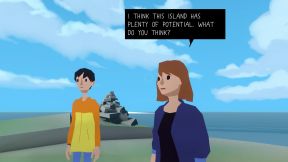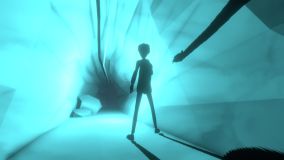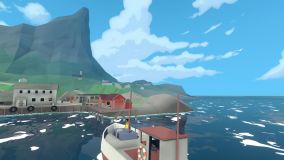This is about four hours of gentle, charming
coming-of-age story telling.
You play as Jesper, a 17 year old Norwegian boy with
an ailing grandfather and a not quite coping mother. You are close to
them both, yet when your grandfather gives you a bracelet and a strange
story, and asks you to embark on a quest to the small and remote island
of Slepp, you feel compelled to comply. That the bracelet has a magical
power only adds to the compulsion. A short, unfortunate while later, you
find yourself disembarking at the pier in this northern outpost.
In typical adventuring fashion, you set out to
explore, discovering little things and big things about both your
grandfather and the island. Environmental issues of the here and now
dominate the latter, the life once lived and its related trappings are
prominent in the former. Plus the story of the bracelet, which unfolds
across the length of the game.
Apart from tugging you forward at various points, as
if it wants to get somewhere, the braceletís power involves manipulating
items. A collapsed drying screen can be rebuilt, a locked door is able
to be blasted open, a gap in a mountain path can be closed, all by using
the bracelet. An icon will indicate it can be used, and a little
mini-game (for want of a better description) will ensue. Two concentric
circles approach each other, and clicking when they are as one will
activate the bracelet. If you fail just try again. It isnít hard, and
you can adjust the speed at which they approach each other in the
settings. If it sounds a bit contrived, it didnít feel that way.
The game starts by saying it is best played with a
game controller, which I suspect is probably right. It was a little bit
fiddly using the keyboard arrow keys, particularly so with one sequence
where running away is required. It took me many goes to get through what
is really quite a short sequence, having to try and try and try again as
the directional arrows failed me. Itís the only such sequence in the
game, and I canít really hold it against it when it told me to play it
differently, but it was frustrating nonetheless.
Getting around in the rest of the game was fine, even
if I did occasionally swerve around the place, and head in the wrong
direction entirely when the camera angle shifted. But it was a small
thing in the overall scheme of things, and didnít detract from my
enjoyment of Jesperís endeavours.
Which was considerable. The look, the feel, the
sound, the tale/s. They all came together in a very satisfying, and at
times even surprising, way.
The visual aesthetic was particularly appealing.
Clean and simple, light and airy, stylized and colourful; these are all
objectives used by the maker when describing its construction, and they
are all apt. The final product fits together well, and nothing looks
like it was ignored in favour of other elements. The polygonal nature of
the modelling is apparent, and contributes to an almost quirky appeal.
The music works a treat as well. Coherent and
laidback says the maker, and I would agree. There is a lot of it, and it
admirably supports the events.
There is no spoken word, speech bubbles of dialogue
audibly popping up as characters converse. Read at your leisure, the
bubble not disappearing until you click. There is a lot to learn and
people to chat with, but it never felt wordy.
You do get to make some choices in the dialogue, some
of which suggest an impact on how some parts of the story play out.
Particularly a detail in a remarkably satisfying final scene, as Jesper
heads back home. Not a complete surprise given some things along the
way, but impactful none the less. You may get a different one, but mine
was poignant, and beautifully done.
Ambient sound rounds things out.
Apart from moving around, most of the rest of the
game is played with the mouse. Left click to examine or chat or pick of
objects, right click to use the bracelet. I would suggest not using the
bracelet icon until you have a reason to do so, as there are times when
it can disrupt the flow of the story. For example, on one occasion I
gathered flowers because I could, and then a cutscene used them in a way
I didnít know I needed to do. Some time later I had the conversation
which led to me needing the flowers, which had already occurred. So wait
until you know you need them!
While you gather some items, having them will result
in them being used when required, so there is no inventory management.
The escape key brings up the menu, where you can fiddle with settings
and access your objectives should it be necessary. An audible scratching
will alert you to a new one being entered. The H key briefly highlights
objects you can interact with in same way. The game autosaves as you go,
and you just choose resume from the menu to pick up where you left off.
A very satisfying piece.
I played on:
OS: Windows 10, 64 Bit
Processor: Intel i7-9700K 3.7GHz
RAM: Corsair Dominator Platinum RGB DDR4 32GB
Video card: AMD Radeon RX 580 8192MB
GameBoomers Review Guidelines
November 2020
design copyright© 2020
GameBoomers
Group




